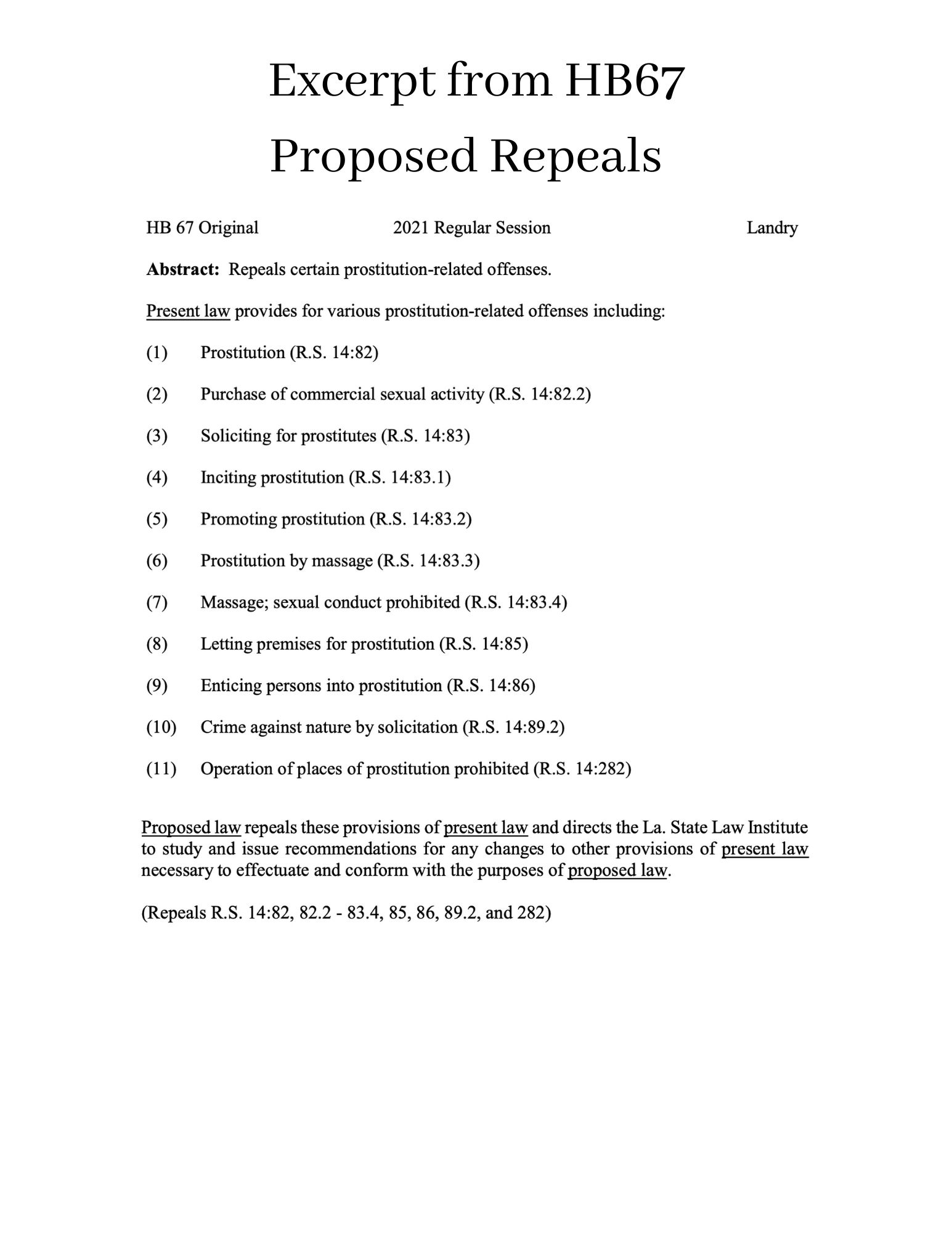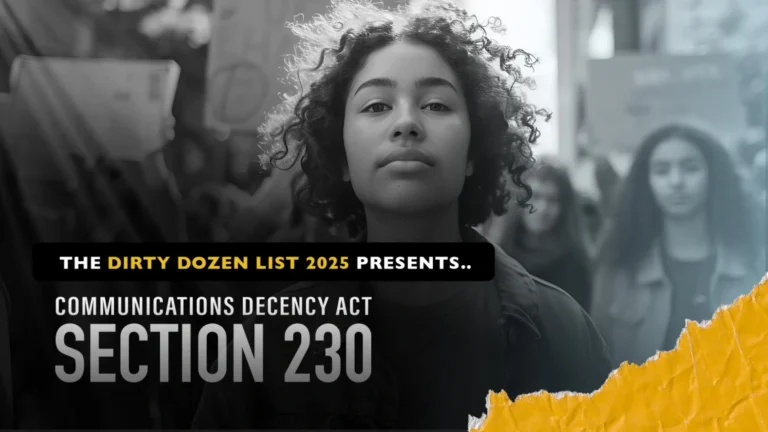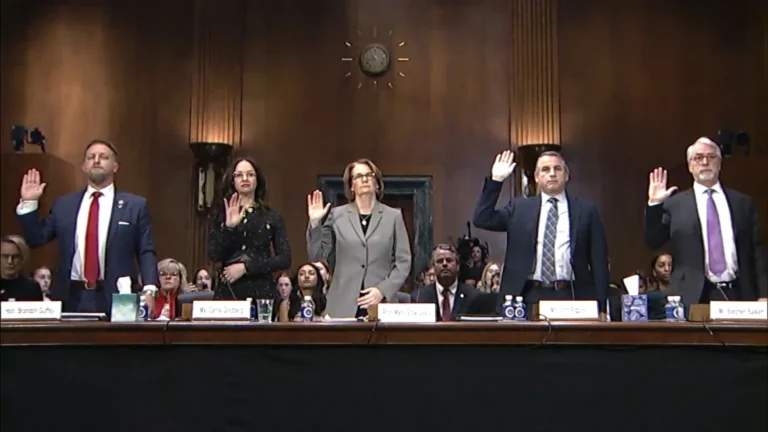On Tuesday, May 4, the Louisiana House of Representatives heard H.B. 67, a bill to fully decriminalize the sex trade. H.B. 67 was sponsored by Rep. Mandie Landry, repealing several prostitution-related statues that would have green-lighted the gulf coast state for sex tourism.
Among the proposed repeals, sex buying, pimping, sex trafficking activity—soliciting, inciting, enticing,and brothel keeping activities would have been legal with no intervention from law enforcement.
The stated purpose of this bill was for criminal justice reform through large-scale decarceration but by fully decriminalizing all prostitution related crimes it would have removed authority for law enforcement to investigate instances of suspected prostitution and thereby discover exploited individuals. Sex traffickers are often brought up on charges H.B. 67 repeals, especially “promoting prostitution” and “enticing persons into prostitution.” Prosecutors need those “lesser offenses” to cope with terrible cases of sexual abuse, because human trafficking cases are notoriously complex and difficult to prosecute. It is a lesser included offense that can be more easily investigated and proved than sex trafficking which has a very high burden and requires the cooperation of victims who are deathly afraid of their traffickers.
Also, by repealing the statues like “prostitution by massage” sex trafficking operations at massage parlors (which is a nationwide epidemic) would be harder to detect as the exploited women in who often do not speak English, are often told to fear law enforcement, have been brought here illegally, and have no support system.
The National Center on Sexual Exploitation opposed this bill because fully decriminalizing the sex trade only increases the demand for the sex trade, while making investigations of sex trafficking—including child sex trafficking—virtually impossible. The bill also would have deprived law enforcement of much needed training funds while depriving victims of designated resources.
In the events that followed the three-hour hearing, it was truly a David and Goliath moment as a few voices of truth spoke up against a well-funded movement to normalize the commercial sex industry.
Sheri Lochridge, Anti-Human Trafficking Team Leader and Survivor, Covenant House New Orleans:
“The assumption that this bill would help decrease human trafficking—that traffickers wouldn’t profit from fully-decriminalized prostitution—hints that many here today still don’t fully understand what drives human trafficking, supply and demand. Repealing the law of Purchasing Sex, as written in this bill, will significantly increase the demand as it did in Germany, driving traffickers to get more supply, placing more vulnerable men, women, and LGBTQAI+ at risk.”
Dr. Will Hall, director of the Louisiana Baptist Office of Public Policy, said “that despite having the strictest laws in the nation against human trafficking, according to the states’ attorneys general around the country, Louisiana still was plagued with human trafficking because of the I-10 and I-20 corridors.”
Glory Blankenship, representing Purchased: Not for Sale, a ministry to sex trafficking victims in Shreveport, told the committee that “This bill would grant greater freedoms to institutions and individuals to further exploit vulnerable populations that we want to protect,”
Diane Amos, Executive Director, Free NOLA:
“Though there is room for improvement, especially in the area of survivor protections, Louisiana has been revered across the nation for our existing legislation to protect survivors of human trafficking- now is not the time undo the decades of work it took us to get here.”
Kathleen Benfield, Legislative Director at the Louisiana Family Forum:
“This bill decriminalizes every aspect of prostitution…Do we want to become a destination for sex tourism?”
Natasha Guynes, a former sex worker and founder of the Washington-based nonprofit HER Resiliency Center:
“With all due respect, can any of you tell the difference between sex work and sex trafficking?”
Caitlen Macias, Youth & Engagement Manager at World Without Exploitation, emphasized that “[t]his bill and the ideology it represents, demonstrates a fundamental misunderstanding of the sex trade and minimizes the lived experiences of survivors. Furthermore, it is beyond reckless to adopt a policy that encourages the sex industry to flourish during a global pandemic like COVID-19″.
Patrina Mosley, Deputy Director of Legislative Policy, National Center on Sexual Exploitation:
“Although the stated goal of the bill is to lessen the amount of incarnated people, in just two short pages comes the most dangerous bill to those it claims it wants to help: the marginalized and those of color. This bill and others like it that want to fully decriminalize the sex trade is also an affront to the dignity of women and sinister grooming for our children.”
With a sigh of relief, this pro-pimp, pro-sex tourist bill was voluntarily deferred by sponsor and committee and will no longer be pursued for this legislative session. VICTORY!



